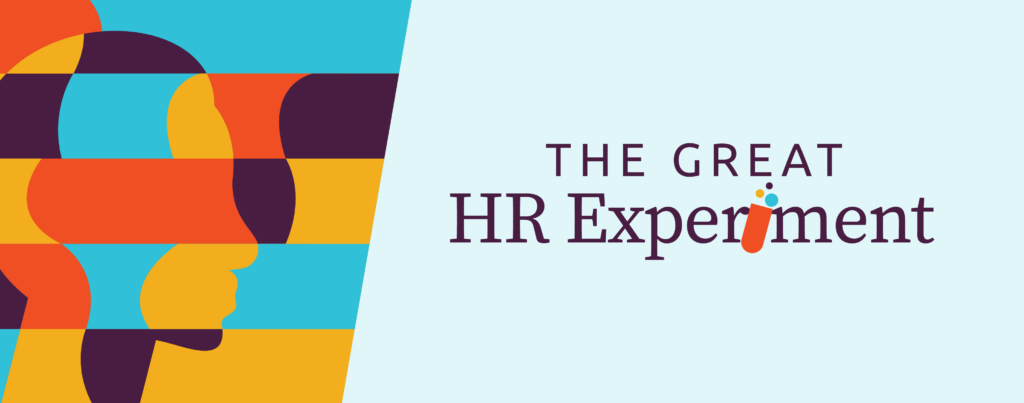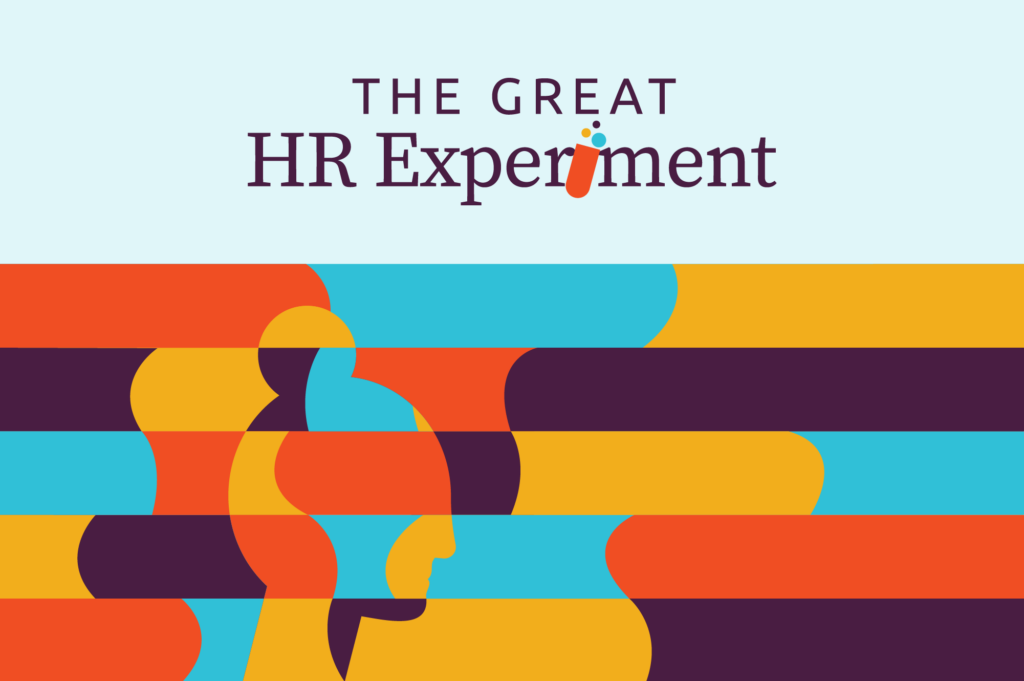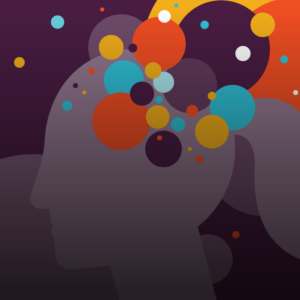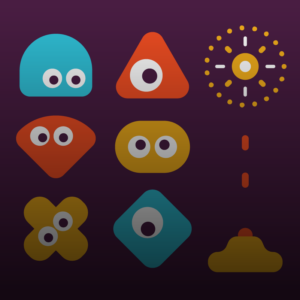Don't just wait to be told who you need to be. Become one of the pioneers who are shaping the future of HR.

The world of work is changing. From a new generation of workers to the widespread adoption of AI, the goalposts for people leaders are moving faster than ever. This means it’s no longer enough to simply react to these developments. It’s time to be proactive in the pursuit of understanding and preparing for the future of HR. This is where “The Great HR Experiment” comes in. Read on to discover:
- HR today & the trends for the future
- Why the future of HR must be shaped by human-centric tech
- How to put People Leaders at the heart of this changing world
- What is The Great HR Experiment?
- How to get proactively involved in The Great HR Experiment
This article culminates in a new initiative for understanding and shaping the evolving world of HR that we’re calling The Great HR Experiment. This is a once-in-a-generation research programme to discover who HR leaders are today and what they’ll need to thrive in tomorrow’s world. The Great HR Experiment is a decade-long deep dive, benchmarking People Leaders across the industry and identifying the skills and systems needed to progress the future of HR itself.
But before we get into the details of this pioneering new project, let’s take a step back and consider where we are today and why now is the crucial time for becoming proactive.
HR today & the trends for the future
A brave new world of technology.
One-third of all jobs worldwide are likely to be transformed by technology within the next few decades (reference 1). And it’s already started.
In the past, businesses had decades to react to, and address, new demands. Today, the demand for skills is constantly evolving, and businesses simply don’t have the resources to keep up. But the challenge doesn’t end there…
As we welcome Gen-Z into our teams, businesses are for the first-time experiencing workers who have grown up with technology – who are skilled in riding the waves of developments – because it’s all they’ve known.
So, what happens when these adaptive, tech-savvy individuals meet the traditional business model?
Frustration, low satisfaction, and a high turnover. Something we are all seeing in the world of work.
The world of people management is a turbulent place right now.
But you’ve heard this all before, right? So, what do we actually do about it?
At the heart of this problem there is a strange paradox. Tech is a key cause of our rapidly changing world. And yet tech is also the solution…
Why the future of HR must be shaped by people-centric tech
The business model we’re familiar with is being shaken up – the only way to hold on, is with a helping hand from technology.
In a recent McKinsy study it was recognised that a move to AI & data-driven processes is one of the leading innovation factors for impacting our people at work. (reference 2)
At Cognisess we think AI and data-driven approaches are crucial for tackling bias and for creating fluidity in the workforce: for freeing up individuals to progress and create career autonomy, and for organisations to innovate. You can find out more about this in our recent talk on skills fluidity
Put simply, it’s becoming increasingly clear that technology will play an ever-bigger role in people management. And this is not just about creating efficiencies, it’s about enabling us all to work effectively in a new tech-driven world. In a recent Deloitte report it was recognised that the use of data has a deeper beneficial impact:
“The new era of the quantified organization can allow leaders to have a holistic view of their organization across levels and use data to identify the areas where true organizational change can have an impact—for employees, for teams and groups, for the organization as a whole, and for society at large.”
Deloitte: Beyond productivity, the journey to the quantified organisation (reference 3)
Embracing tech, and evolving to a full data driven approach is clearly the way forward. But big change comes with it’s own challenges: according to McKinsey, 70% of business transformations fail (reference 4). This is largely because the people are not properly considered.
This means, that in a brave new world of rapid change, the role of the People Leader has never been more vital.
But, if you’re an HR Leader, have you ever stopped to think about how this affects you personally?
How is the role of a People Leader itself changing?
What makes you a top people professional?
How do you map your own career in this changing world?
As Samantha Miller puts it:
“The pace of change has never been faster and HR professionals are at the forefront. We are so proactive in supporting and preparing for the future of work for others we can be guilty of forgetting about our own profession.”

Samantha Miller
Head of People at Doddle
The very people that are going to be leading the charge in a brave new world, are also likely to be the people most effected by our rapidly changing world.
As thought leader Nicholas Bebahani succinctly adds:
“If there’s one relationship the CEO should invest in now, it’s with their Chief HR Officer” (reference 5)
How to put People Leaders at the heart of this changing world
Over the last five year Amy Stephenson from “Human: People and Culture”, has been interviewing HR leaders through her popular podcast “The Human CEO”. She has been finding out what People Leaders really think about the HR profession and how it is changing.
To really understand this wealth of vital information we set our data-scientists at Cognisess the task of analysing Amy’s interviews. With over 100 hours of transcribed interviews to decipher they built a natural language AI to look for trends and patterns.
Unsurprisingly they found out that the most talked about topic amongst People Leaders was “Personal, Professional and Career Development”
People Leaders are interested in the development of people.
This seems like such a blatantly obvious statement, but it got us thinking…
Whilst People Leaders busy considering the careers of everyone else in the business, who’s thinking about the careers of the People Leaders themselves?
Turns out, very few people. At least formally.
So, we’re setting up a project to address this.
Our project advisor Sharon Frost succinctly summarised the project idea:
“As HR leaders we spend much of our time considering the skills of other people. It is both fascinating and refreshing to consider our own careers and future development through this exciting project. Especially at a time when HR is seen by many as such a valuable contributor to the significant and ongoing changes in the workplace.”

Sharon Frost
Global HRD at Oxford PharmaGenesis
The first part of the project is to continue our study with Amy Stephenson into the evolving priorities of People Leaders. This will involve regularly interviewing a core group of leading HR professionals and analysing this vast and vital body of data using our AI Language models – looking for themes and changing priorities over time.
As Amy notes:
“HR has gone through many transitions in the recent past, but never on the scale we are seeing and about to see. This study will establish how we future-proof the profession for what’s coming next”

Amy Stephenson
Managing Director Human: People and Culture
This analysis will form one part of a larger longitudinal project that we are calling The Great HR Experiment
What is The Great HR Experiment?
As well as understanding what People Leaders think and care about, we also want to get into the heart of the role itself – what skills and behaviours are needed for the job of a People Leader and how is this evolving?
For this we’re setting up a benchmarking study on the Nature of the HR Director role itself, with a deep dive into the skills and behaviours of over 1500 leading HR directors.
Every HRD that takes part will carry out a series of online games and questionnaires that use cutting-edge neuroscience, AI and psychology to understand skills and behavioural preferences. This will provide a benchmark for both the Human and Hard skills of People Leaders today, and it will form the basis of an ongoing study where we can map the changing skills and behaviours of HR professionals as the world of work changes.
Analysis of the evolving skills will be led by data scientists at Cognisess and we’re also engaging with the Alan Turing Institute’s “Data Study Group” – where some of the country’s top talent from AI and data science are bought together to work on complex real life data challenges. Endorsed by Dr. Panos Panagiotopoulos, Fellow of the Alan Turing Institute, and QMUL Senior Lecturer.
The project will also create an ongoing online portal where HR professionals can anonymously review their skills in real-time against their peers. To see where they need to ‘skill up’ to enable progression, and to understand how to take the next important career steps.
As, Jayne Casey, says:
“This study is a chance to truly hear from the profession itself as we gain more insight into the skills we have today and what we will need for future business models. It’s a truly exciting prospect and I’m looking forward to seeing it evolve.”

Jayne Casey
Global VP HR Digital and Business Services at NTT
How to get proactively involved in The Great HR Experiment
If you’re an HR Professional, you can take part in the benchmarking study here:
Taking part will involve about 40 minutes of your time. You’ll be asked to create a free Cognisess account, and then you’ll be guided through a series of interactive games and questionaries.
The assessments use a robust combination of psychology, neuroscience, and AI to measure skills and behaviours. You can find out more about the cutting-edge science and technology behind the project here.
All results are anonymised. At the end of the study, you’ll be sent a personalised report that will show how your skillset compares to others across the industry.
Don’t miss the chance to be part of the initial cohort that we follow over the next 10 years.
If you would also like to be interviewed for our ongoing “Evolving priorities of HR” study please get in touch with Dr Jared Skey or Dr Kelly Neaves – project leaders at Cognisess.
Interviews take roughly 30 minutes and are fully anonymised.
To find out more about the overall project please download the free project information guide.

Sign up to our Newsletter
Keep up to date with a collection of articles, resources and insights for people hiring, managing and developing your people.



